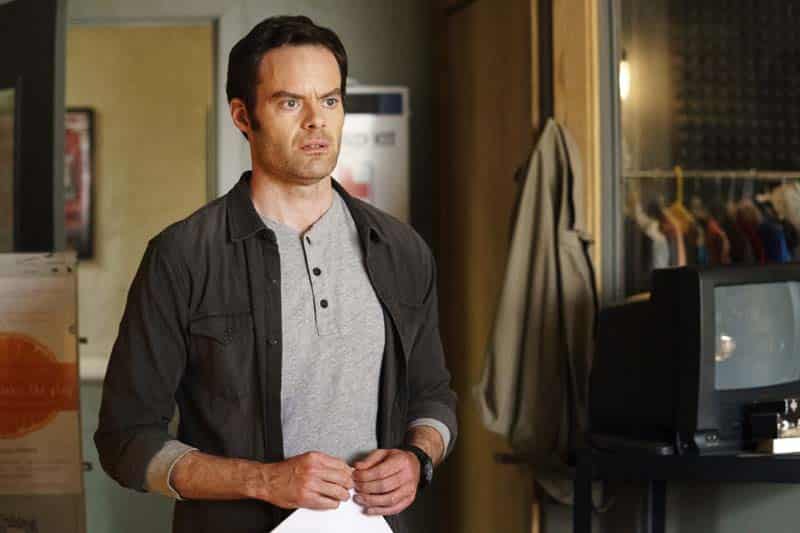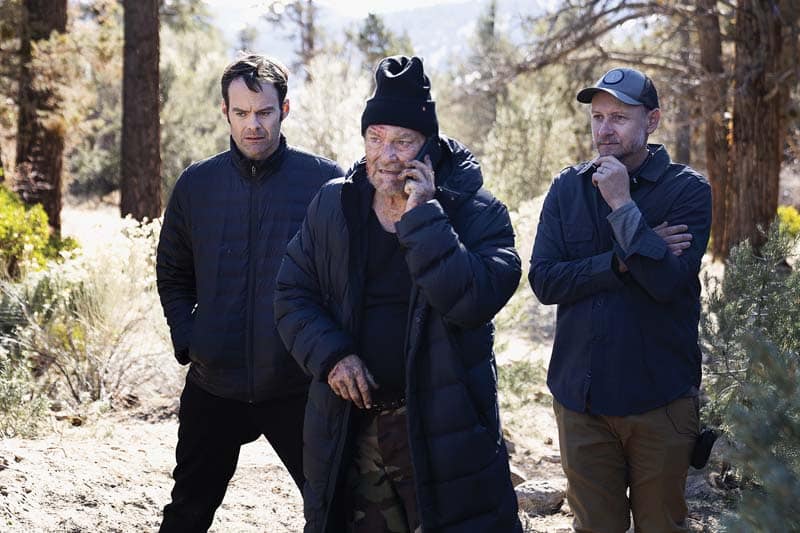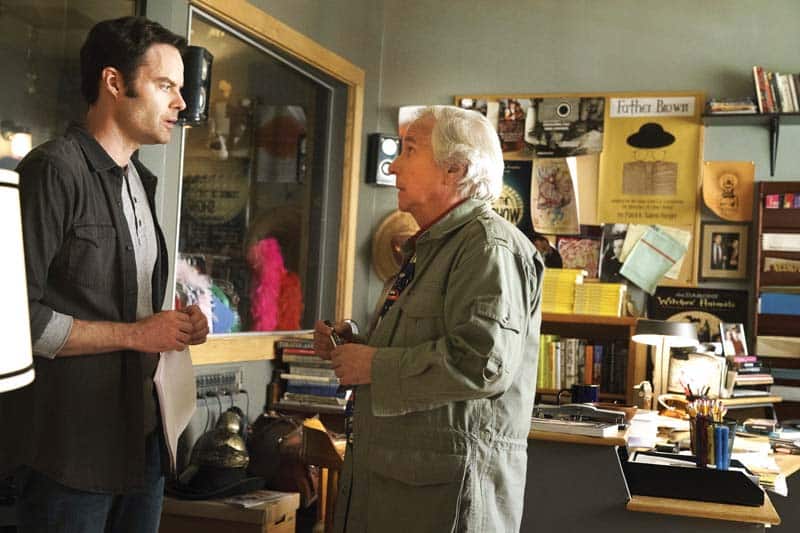HBO’s killer comedy highlights the SNL alum’s range

A dark comedy about a hired killer? What are the chances of a show like this taking off and being both a critical and commercial success? Look no further than Barry, the half-hour HBO series starring Bill Hader, who co-created the show with comedy writer/producer Alec Berg (Seinfeld, Silicon Valley). Hader’s title character is discharged Marine turned hitman Barry Berkman, who transitioned into his current career via family friend/handler Monroe Fuches (Stephen Root). Berkman is sent to California from his Cleveland home base by Fuches to perform a hit for the Chechen mob. The intended target is Ryan Madison, an aspiring actor, who is having an affair with the mob boss’ wife. Berkman follows him to an acting class taught by coach/author Gene Cousineau (Henry Winkler), where Berkman is mistaken for someone looking to become a student and is roped into reading a scene with Madison. Cousineau is disgusted by Berkman’s performance until the latter explains he is really a hitman looking to lead a different life. Cousineau thinks it’s an improvised performance and offers Berkman a slot in his class.
The narrative arc that’s woven throughout the show’s two seasons is one that involves whiplash-inducing pivots from the ridiculousness of modern-day life to the violence inherent in Berkman’s world. It’s a definite twist on the kind of comedy fans expect from the likes of Hader and Berg, and something the duo was looking to do when they first started working together about six years ago.
“Our initial idea [for Barry] was very much a kind of day-in-the-life kind of comedy. And not that this is bad, but there were a lot of those at the time and those are a lot of shows that I liked. I wanted to know what we could do that would be different. What if we had life and death-type stakes? We quickly came up with this idea and saw the story potential of a guy in between two worlds and his trying to navigate these two worlds,” Hader explained. “The situation was inherently crazy and funny, so we thought, ‘What if we played this very grounded?’ We made it very real. I think a lot of people would have heard this idea coming from us and thought it would be a very glib kind of, over-the-top comedy, but I think the tone kind of surprised people. We wound up doing a lot of the things that I always wanted to do and what Alec said he wanted to do—that kind of [real-life absurdity] story. But you do get talked out of it a lot, especially in comedy. They say you can’t be funny after you’ve seen a very realistic killing or something like that. I think what helped us was the situation.”
Hader’s investment in Barry includes writing, directing and show running. As a passionate film buff whose influences include Martin Scorsese and Akira Kurosawa, the Oklahoma native’s drive for his current project is to infuse a finite truth about humanity in the narrative. In this case, a character caught in an existential web centered on figuring out his role in life—a situation many people find themselves in. The difference is that the stakes are considerably higher for Hader’s character, something he points out when asked to describe the show to the uninitiated.
“I would say [Barry is] about a guy who thinks he’s been put on this Earth to kill people and he’s hoping that it’s not why he’s been put on [the planet]. He’s trying to find a community and figure himself out,” he said. “I think it’s a thing that a lot of people deal with, which are those inherent things about yourself that you don’t like and the things you see in your parents or siblings that people tell you about yourself. People are constantly telling Barry that he’s good at killing and he doesn’t want to be known for that. It makes him feel bad about himself. I think a lot of people, to a way lesser degree, have the same kind of issues. Yeah, you drink a lot or are a party person. Or you’re super straight or uptight. You’re tight with money. And you start questioning yourself.”
Each season is eight episodes long (the show was renewed for a third season on April 10). And while fans may be left clamoring for more, Hader admits that he and Berg were more concerned with keeping the storytelling tight and vibrant, which is a considerably more difficult task if a network expects two or three times as many episodes.

“My frustration with a lot of television is when you feel like it’s running in place and I feel like they don’t know where they want to go. Sometimes you can’t help that. You’ve got an order of 20-something episodes and you’ve got to fill air time. So you can’t always have a ton of narrative propulsion and can’t always keep it exciting and have people going, ‘Oh my God, what’s going to happen next,’” Hader admitted. “HBO asked if we wanted to do 10 episodes and we purposely did eight. We like eight. That kind of forces us to make harder decisions with the writing. We can take our time crafting eight episodes as opposed to shooting episodes one through 10, while you’re writing 11 through 20. Invariably, you would do a whole episode about this tertiary character. Some people love that. I get a little antsy. I think that was a nice thing—a lot of people thought we would automatically opt to do more and we said that we wanted to do less.”
While there are many challenges involved with wearing so many creative hats, Hader combination of passion and his work ethic find him embracing the enormous tasks at hand. He is quick to point out the fortune he and Berg had in terms of the talent they’re working with (“Henry, Anthony [Carrigan], Paula Newsome, Steven and Sarah Goldberg and everyone who came in and read—they all auditioned— and we got very lucky.”) Otherwise, Hader’s focus is on maintaining a solid story arc for a narrative that involves plenty of moving parts, something he admits can be a bear to deal with at times.

“I think the biggest challenge is keeping the story in your head. While you’re shooting, I have all these kinds of jobs on the show, but they’re all in service of the story. You’re just trying to get the story told and everything else, from the directing to the writing and acting—it’s all in service of that one thing. A lot of it is just trying to balance all that,” he said. “We may have a cool shot, a great performance, this amazing piece of set design or a great joke—but those things sometimes have to get cut because they get in the way of the story. As a show runner, that’s usually what I’m doing—I’m watching what everyone is doing. But I’m constantly doing the mental math in my head, where I may notice something that’s interesting, but it may step on something else that comes along later, so we can’t do that. Or it could be something that actually helps the thing that we’re doing later.”
Barry airs on HBO. Check local listings for times.
Stay tuned for Bill Hader’s favorite directors.


















